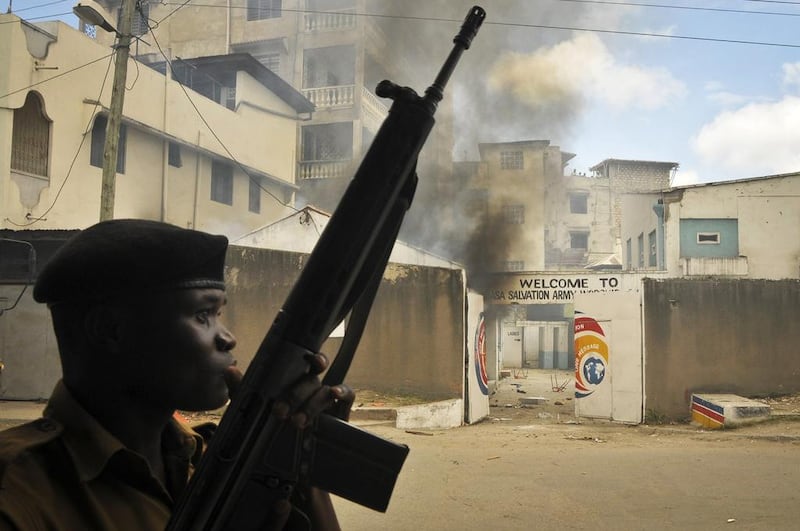MOMBASA, Kenya // Four Kenyans were killed in Mombasa on Friday during riots sparked by accusations that security forces were behind the assassination of an imam.
Three people died of stab wounds, the national crisis centre said, raising the toll after a man was killed by gunfire earlier in the day. Seven more wounded were in hospital.
The protests came after Sheikh Ibrahim Omar and three other men were shot dead in a car late on Thursday.
His killing ignited religious tensions two weeks after Islamist militants killed at least 67 people in a raid on Nairobi’s Westgate shopping mall.
He preached at a mosque that has in the past been linked to Al Shabab militants, who claimed responsibility for the shopping centre attack.
During Friday’s rioting, thick smoke from burning tyres rose around Mombasa’s Masjid Musa mosque, where Omar used to preach, as police fired tear gas and youths hurled stones in return. Several gunshots were heard.
Youths torched a Salvation Army church and temporarily blocked the main road into the city.
The worst of Friday’s clashes with police took place in Mombasa’s downtrodden Saba Saba neighbourhood, where traders shuttered their shops and residents fled for safety.
Salim Abdallah said he saw one man who had been shot in the belly “bleeding profusely” with his clothes soaked in blood.
“We just pray for him,” Mr Abdallah said.
Sporadic clashes and looting were reported in several districts of the city, but as dusk approached, the police insisted they were in control.
“We will not tolerate unruly youth taking over the town,” the Mombasa police chief Kipkemoi Rop said. Twenty-four people 24 were arrested.
Omar was shot in Mombasa’s outskirts on the main road to the resort town of Malindi, a few hundred metres from where another firebrand cleric, Aboud Rogo, was shot dead in his vehicle in August 2012 in a strikingly similar attack.
Both Kenya and United States had accused Rogo, who also preached at the Masjid Musa mosque, of recruiting and fund-raising for Somalia’s Al Shabab.
Rogo’s death last year unleashed deadly riots in Mombasa’s rundown neighbourhoods where he commanded a loyal support base.
Both imams were popular among youths in Mombasa and along Kenya’s Indian Ocean coastline where many Muslims feel marginalised by the predominantly Christian government.
“This is no doubt a police execution given what has happened in Nairobi,” said Abdul Hassan Omar, 37, in Mombasa’s Majengo district, where Omar and Rogo both preached.
Robert Kitur, Mombasa police spokesman, dismissed the accusation. “The police have nothing to do with the shooting. That’s not how we operate,” he said.
The September 21 assault on the Westgate mall was the worst militant strike on Kenyan soil since Al Qaeda bombed the US Embassy in Nairobi in 1998. The raid shocked Kenyans and the world and has raised questions over intelligence failures.
Authorities “have panicked because of their own laxity which killed Kenyans at Westgate. Now they are trying to save face by sacrificing innocent Muslims,” said Hatib Suleiman, 21, who prays at Omar’s Masjid Mussa mosque.
“We are not going to take this lightly.”
Al Amin Kimathi, chairman of the Muslim Human Rights Forum, said Omar had been a student of Rogo and had publicly espoused the hardline ideological beliefs of his former mentor.
Another hardline imam, Abubaker Shariff Ahmed accused the police of the “outright execution” of Omar and his comrades.
“The police are killing people while saying it is a war against terrorism, this is a war against Islam,” said Mr Sheikh Ahmed, who is also on a UN sanctions list, accused of recruiting and fund-raising for Al Shabab. “These people have been executed.”
Police appealed to the public for information on the attack on the cleric.
Salim Abdi was the only person in the car to survive the attack.
“There were gunshots and the vehicle veered off the road, I don’t know how I walked out of the vehicle alive,” Mr Abdi said. “All four others I was with in the vehicle died on the spot.”
* Agence France-Presse with additional reporting by Reuters





